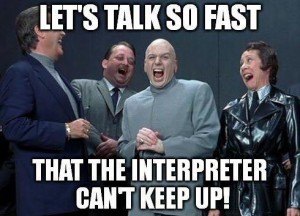 Knowing what your client needs and expects from you is a baseline for providing a great product or service. But when you learn the inner workings of your client’s work experience, you will be able to turn that insight into empathy and resolve problems and save a worthwhile client relationship.
Knowing what your client needs and expects from you is a baseline for providing a great product or service. But when you learn the inner workings of your client’s work experience, you will be able to turn that insight into empathy and resolve problems and save a worthwhile client relationship.
My market is the judicial field. Non-paying or slow paying clients is the most common complaint I hear from colleagues, both freelance court interpreters and Translation and Interpreting agencies alike. I’m not immune to this experience. I have perfected rates and terms that meet and surpass the high standards set by the judiciary and lawyers. I deliver them whenever someone enquires about my services or availability and I politely require acceptance in writing before I accept an assignment. But as much as I study my client’s industry and keep up with their regulations and legislation, I haven’t found the magic tactic to guarantee on time payment.
Then I read the post by a lawyer who was really angry at clients who don’t pay him. http://lawfirmsuites.com/2013/10/shop-talk-deadbeat-clients/
He had me at the title of the post Clients Who Don’t Pay Piss Me Off. Notwithstanding the irony of the source of the complaint, after reading that post, I can honestly say I felt his pain.
I have heard a lot about the business of law and I have paid attention. I listen to shop talk by clients who are personal friends and I ask questions. I grew up in a family of lawyers that includes two Supreme Court Justices. In my continuing education classes, I teach interpreters to pay attention to the business of law. But the raw resentment expressed in this man’s post is exactly how I feel when I have to enter into the ugly phase of collecting a fairly earned fee. The fact that collecting from law firms is a regular component of doing business for me and my colleagues makes this lawyer’s perspective all that more valuable.
Every situation that he describes in his post has happened to me. I have endured clients not paying, delaying payment and not responding to late notices or phone calls, and even clients asking you to cut the already agreed upon rate after the assignment is completed, His sense of betrayal and having been disrespected is all too familiar. It is disrespectful to not be paid your hard earned fees.
When I read his advice to lawyers: You shouldn’t do business with clients who do not respect the value of your services, I wondered if he had read my articles or attended one of my classes.
My take away from that post was that I can now apply a layer of empathy to my terms policy. I can approach clients from a more shared experience. We are both giving our best services to the client. We are held to an oath and regulations most professionals wouldn’t tolerate. And we both truly respect the judicial system that we serve.
But the most significant take away I got from that post is knowing I can say to my client, ”I understand”.








